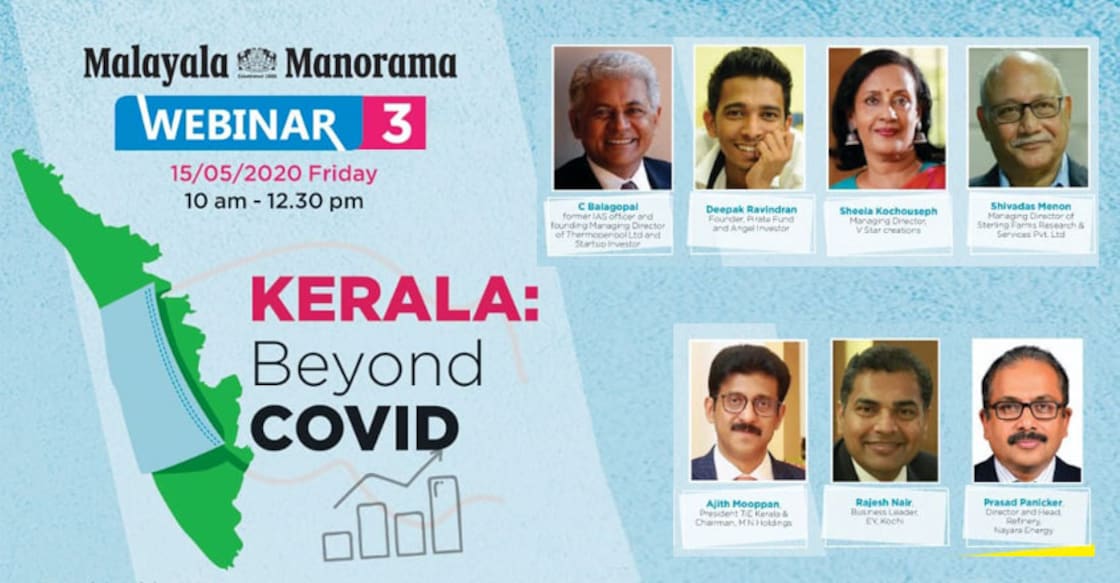Post COVID Kerala has to be a digital hub with strong roots in farming: Manorama webinar

Mail This Article
The third and final episode of the webinar on Kerala's opportunities after COVID crisis, organised by Malayala Manorama, focussed on making Kerala self-reliant in agriculture and explored the possibilities of making it a digital hub.
Shivadas Menon, managing director of Sterling Farms Research and Services, exuded confidence that Kerala can transform itself into a producer state instead of continuing as a consumer one by making use of its agriculture potential.
"There's a huge opportunity for farming for which a lot of inputs are needed. There are opportunities for manufacturing of water-soluble fertilisers, water management systems, micronutrients etc. We have enough land here. Our problem is that a lot of barren lands is lying here and there. We have to use technology to increase productivity. I think we can produce entire vegetables for our needs in the state itself. Instead of importing 5,000 tonnes of vegetables every year, we should export at least a few tonnes," he said.
C Balagopal, managing director of Thermopenpol Limited, stressed on the need of distributed manufacturing model as well as the scope of making use of health-related data.
"We need a distributed manufacturing-processing assembly model for both agricultural businesses as well as manufacturing sectors. The power of women's self-help groups can be tapped for more than running free kitchens and healthcare during crises. We should make use of their productivity much more," the former IAS officer said.
His main suggestion was to make use of Electronic Medical Records (EMR) to create proper health data. "We must start with a programme for making available EMR data through appropriate methods, ensuring data privacy. We can use it even to do a risk stratification of the entire population. It is going to be important in the post COVID days," he said.
Rajesh Nair, Business Leader, EY, Kochi, proposed to make a cluster of manufacturing units. "It has to be an ecosystem where the companies benefit from each other," he said. He also suggested to set up global capability centres that would facilitate the services needed during a period when firms across the world are promoting 'work from home' model. He also highlighted the need to raise a disaster relief fund that can be used to help the MSMEs in dire straits due to the lockdown.
Rajesh suggested creating an opportunities platform for senior professionals and entrepreneurs who are coming back (from abroad).
Sheela Kochouseph, who heads the V-Star creations, wanted the government to arrange more infrastructure for industries. She suggested that the government engage efficient private companies in sectors where it is possible.
Young entrepreneur and founder of Pirate Fund, Deepak Ravindran said the government should help startups in terms of orders and other services. On an optimistic note, he said the state can make use of the entrepreneurs who come back from abroad due to the COVID crisis.
Prasad Panicker, director and head, refinery, Nayara Energy, also expressed similar hopes.
"Kerala's social capital has increased due to the COVID situation. Not only within the country but across the world it has been noticed that as a society that managed a crisis much better than some of the so-called developed countries. Kerala has to look at how we can make use of this opportunity to bring more and more investment to the state," he said.
"We should have our brand in tourism. I'm unable to understand why we don't give focus on Ayurveda. It has already become a brand of Kerala in many parts of the world," he said, suggesting measures like clinical trials to strengthen people's confidence in the field of medicine.
Ajit Mooppan, president, TiE Kerala and chairman, MN Holdings, also stressed the need to make Kerala a wellness hub by highlighting the state's achievements in disease prevention and immunity building. He also wanted the state to become a skills development hub where the returning expatriates can help in imparting skills to the people here.
Former planning board member and founder CEO of Technopark G Vijayaraghavan moderated the webinar.

